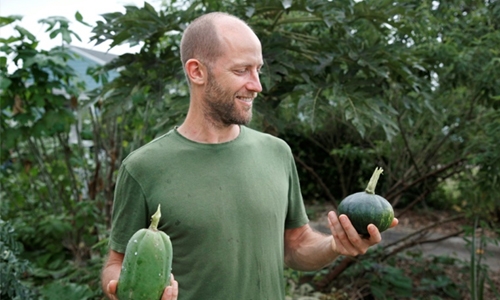How to live off the land... in a major US city
Rob Greenfield needs a lift. He often does, as he doesn’t own a car. Ride sharing is one of the many ways in which he tries to reduce his carbon footprint -- but the other is more extreme. For the past year, he hasn’t spent a cent on food. He only eats what he can grow in his own garden or nearby gardens, what he can fish for -- or what he can peel off the highway. Yes, roadkill is an option for the 33-year-old Greenfield.
He’s an urban forager. “Nature has been my garden, has been my pantry and it’s been my pharmacy,” explains the environmental activist, whose one-year challenge to eat only what he can find himself ends on November 10. Greenfield launched the project in Orlando, the theme park capital of the world in central Florida. The greater metropolitan area is home to about 2.5 million. It seems like an unusual place to hunt and gather, but the subtropical climate has helped him offset the urban setting.
“For the last year, I’ve been growing and foraging 100 percent of my food -- no grocery stores, no restaurants, no beer at a bar,” Greenfield tells AFP. “I want to inspire people to question their food and then to change their diets, to start to grow their own food, to support local farmers and eat in a way that is better for the Earth, our communities and ourselves.”
Backyard cuisine
He’s been living in a tiny home in someone else’s backyard -- the owners said he could squat there for the purposes of the project. He’s usually barefoot and wears the clothes he’s often seen in on YouTube, where’s he documented his year of foraging. “I think that the human body developed really well over tens of thousands of years and I don’t believe that Nike has got it all figured out in the last blink of the eye of the human experience,” he says.
Greenfield has transformed the yard into an urban farm -- papayas, bananas, sweet potatoes, eggplant, cucumbers and peppers are all thriving. He put together an openair kitchen of sorts, where he keeps his provisions and the honey he produces himself from four honeycombs. He’s also built a toilet al fresco -- and uses leaves for toilet paper, explaining: “This is softer than anything you can buy at the store.”
During the interview, he feasts on a bowl of venison, sauerkraut, green papaya, turmeric, red pepper, coriander, garlic, dill and sea salt, cooked in coconut milk. His breakfast is capped with some moringa leaves, which had numerous medicinal uses. Greenfield found the dead deer on a road in his native Wisconsin, where he spent his summer vacation.
And the salt? “I go to the ocean and I collect the saltwater from the ocean. I just fill up a jar or a jug and then I put that onto a stove to boil it down. That makes good sea salt.”
The simple life
Greenfield says that he first made the decision to live more “simply” in 2011. Up until then, he was living what he called a “pretty typical American life.” His goal: “To be a millionaire by the time I was 30.” In 2014, he dissolved his marketing company. He first earned public attention in 2016, when he walked through New York wearing all of the garbage he produced -- an effort to call attention to the huge amount of waste generated by Americans.
After that, he decided to start his experiment in urban foraging, to cast a spotlight on the possibilities of sustainable living. He lives off public speaking fees and proceeds from his books, though he usually offers talks for free. This year so far, he has earned just $9,760. In 2018, the total was $8,000. Both are well below the poverty level of about $13,000 for an individual living alone. “For me, this is about deeply exploring my food and understanding it and at the same time taking people along on this journey,” Greenfield says.
He says he donates most of what he earns to non-profit organizations -- despite a fair bit of media coverage of his story, he says he wants to avoid getting rich from his projects. “It’s about the message, and I don’t think I should get wealthy off of the message of helping others,” he says.
“I’ve created a system to help myself not ever lose those good intentions. I believe in living humbly and I don’t think it would be easy to live humbly with a lot of money.” Once he’s finished on Sunday, Greenfield is not sure what comes next -- for now, he’s planning on traveling around the world.
Related Posts

